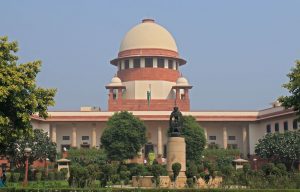
New Delhi, August 22, 2025 — The Supreme Court of India on Friday revised its earlier order dated August 11, which had placed a blanket ban on the release of stray dogs from shelters in the Delhi-NCR region. In a significant development, the Court has now allowed the release of stray dogs after sterilization and vaccination, provided they are returned to the exact location from where they were picked up.
The revised ruling was delivered by a three-judge special bench led by Justice Vikram Nath, along with Justices Sandeep Mehta and N.V. Anjaria.
Key Highlights of the Supreme Court’s Order:
Stray dogs may be released only after undergoing sterilization and vaccination.
Rabid, potentially rabid, or aggressive dogs are exempt from release and must continue to be housed in shelter homes.
The Court has imposed a ban on feeding stray dogs in public places such as roads and sidewalks.
Municipal authorities are instructed to establish designated feeding zones within municipal wards, based on the stray dog population and density in the area.
Notice boards must be placed near these feeding zones clearly stating that feeding of stray dogs is permitted only within these areas.
Legal Action for Violations
The bench emphasized that individuals found feeding stray dogs on streets or outside the designated areas will face action under relevant legal provisions. Furthermore, if any public servant is obstructed from performing their duties in relation to stray dog management, those responsible will be held accountable.
Adoption of Stray Dogs Encouraged
In a progressive step, the Court noted that animal lovers may apply to adopt stray dogs through the Municipal Corporation of Delhi (MCD).
Pan-India Scope and Case Consolidation
Expanding the case’s scope nationwide, the Supreme Court has made all States and Union Territories parties to the matter. It has also ordered that all pending stray dog-related cases in High Courts across India be transferred to the Supreme Court, ensuring a unified approach to the issue.
The bench passed this order in response to petitions challenging the August 11 directive. The case is now scheduled for further hearing in October 2025, after eight weeks.